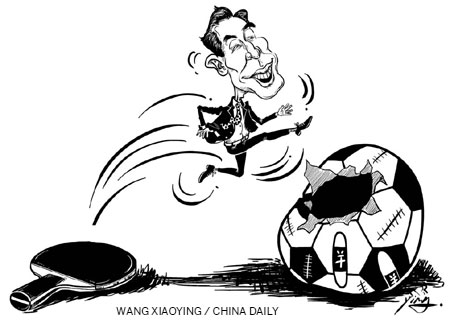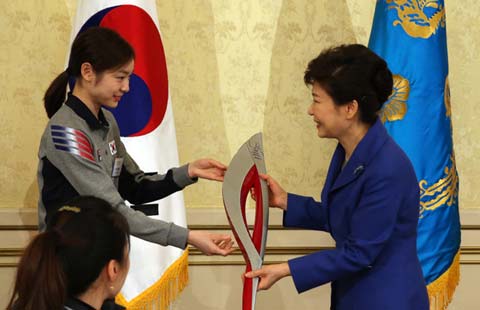

Cai Zhenhua is a much-loved figure in China, both as a former world table tennis champion and coach of the national team. Before he took over as coach, the Chinese men's table tennis team had been pushed by European players to play second fiddle in international competitions. His leadership, from the mid-1990s to the early 2000s, however, ensured that the Chinese squad regained its unconquerable position.
Little wonder then that Chinese soccer fans have high expectation from Cai, now that he has been appointed as chairman of the Chinese Football Association. But Chinese soccer fans need to be realistic.
Cai, given his accomplishments as a world-class table tennis player and outstanding manager, is the right person to build a strong national men's soccer team. Yet the Chinese men's soccer team has a history of letting down the largest group of soccer fans in the world, irrespective of the person in charge. Can Cai really change history? We hope he can.
Still, the core problem of Chinese soccer has little to do with who is in charge of the national governing body. The core problem is whether the country has a pool of young soccer talents and a high-quality league for them to showcase their skills. All the top soccer powers in the world rely on these two aspects to build their national teams. China should be no exception if it wants to excel even in Asia, which lags behind Europe and Latin America in soccer.
But returns in sport, as in any other field, cannot be instant. It takes time, money and energy to cultivate young players.
The Chinese football league started in the 1990s. Since it is young compared with other countries' leagues, a long-term strategy still does not figure high on the agenda of many decision-makers in the league, such as CFA policymakers, club managers and investors and local officials. What they care most about is how to make the national or club teams win more titles or how to get greater returns on their investment, instead of focusing on how to train young players at different levels to ensure the long-term strength of the senior team.
For many years, therefore, decision-makers in soccer governing bodies have prioritized selecting good adult players, famous coaches, or, in the latest case, a soccer ambassador, with the aim of fast-tracking the national or club team to success.
Apart from fattening the pockets of many clubs and investors in the soccer business, the fast-paced economic development of China has also fueled investment fever. Now good European and South American players and coaches can earn much more money in China than in many other countries' - even if they fail to improve the team they serve.
The most infamous case is that of Jose Antonio Camacho, the famous Spanish coach, who was sacked as the coach of the national men's team after it lost to minnow Thailand 1-5. Despite firing Camacho, the CFA, according to the contract, has to pay him more than 50 million yuan ($8 million) as compensation and another 25 million yuan as tax allowance, according to media reports.
How much did Camacho earn in China? $3.5 million a year. What is his record as boss of the Chinese team? Seven wins, 11 losses and two ties. Does the result justify his earnings? The answer is obvious.
China has hired a number of foreign coaches in recent years, but the Chinese team has failed to make much improvement. Policymakers should rethink their strategy and shift their focus on more meaningful areas. For example, they should encourage more young people to play soccer, be on the constant lookout for young outstanding players, and build a quality national league that is free of corruption.
For years, the country's soccer league has been fraught with scandals, such as match-fixing and bribery. Some senior officials and players have even been tried and put behind bars for their illegal activities. Such a scandalous league is bound to drive away investors and players who are interested only in the cause of soccer, creating a void in the reserve pool for the national team.
Only when we extend genuine support to young players and build a clean and popular league, which attracts big foreign names, can we expect to build a formidable Chinese soccer team. Before that happens, it is reasonable to assume that the team will continue to let us down - even under the leadership of a legend like Cai.
The author is a senior writer with China Daily.
xinzhiming@chinadaily.com.cn.

(China Daily 01/24/2014 page9)







